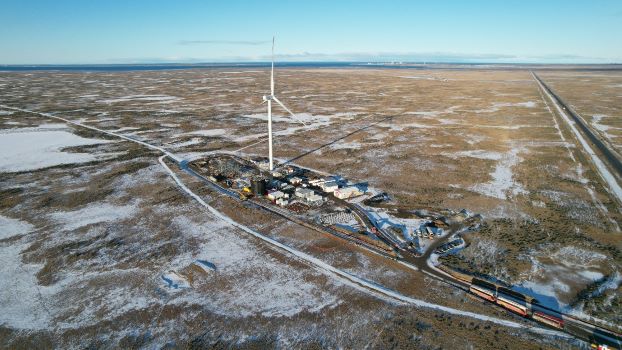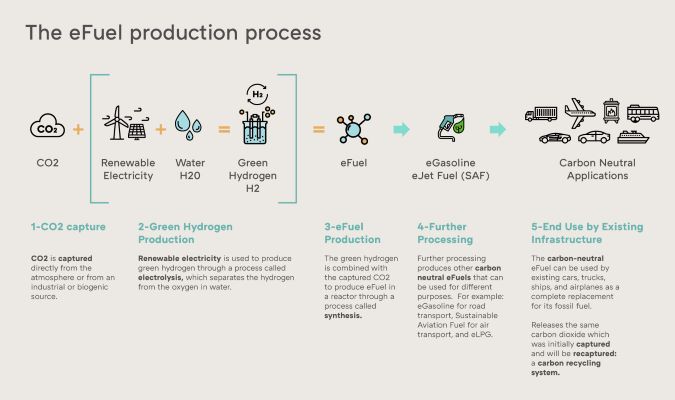Green hydrogen
HIF Global - Chile
|
Basic description Haru Oni is an e-fuels[1] production project developed by HIF Global and located in southern Chile’s Magallanes region. A demonstration plant reached the final investment decision in 2021, with construction set to begin in September 2022 and the plant expected to be commissioned by October 2022. Under this project, renewable electricity produced by an on-site 3.4 megawatt (MW) onshore wind turbine will power a 1.2 MW electrolyser to produce 143 tonnes of green hydrogen annually. Hydrogen will then be synthesised with carbon dioxide (CO2) captured from the atmosphere with a Direct Air Capture (DAC) system to produce carbon neutral or low-carbon e-fuels. These e-fuels will have physicochemical characteristics similar to fossil fuel-based gasoline and liquefied petroleum gas (LPG). While the demonstration plant has an annual production capacity of 130 thousand litres of e-gasoline, the project is expected to ramp up production to 66 million litres annually by 2025 in its next phase (“HIF Cabo Negro”) set to begin construction by end 2023. The scaled-up production of HIF Cabo Negro will correspond to the annual fuel consumption of 50 000 cars, and the project will be supplied by a total wind power capacity of 325 MW and electrolyser capacity of 240 MW. In the longer term, HIF Global aims to further scale up capacity expansion by more than 10 times to reach 700 million litres, a quantity equivalent to the annual fuel demand of around half a million passenger-vehicles. HIF Global is also expanding beyond Chile with similar projects. An industrial site and potential partners have been identified in the United States for a large-scale e-fuels facility with 2 gigawatts (GW) of electrolyser capacity and expected annual production of 700 million of litres of e-fuels. Construction and operations are expected to begin by 2023 and end 2026 respectively. |
 |
 |
Project rationale HIF Global aims to leverage the market opportunity for decarbonising the transport sector with green hydrogen derivatives and end products such as e-methanol and e-gasoline. Given that there is already a premium market for e-fuels, with existing indices on energy exchange markets as well as infrastructure for storage and transport of these fuels, the time-to-market for their products would be short. Further, market maturity will enable consumers to switch more rapidly from convention fuels to e-fuels, thereby realising short-term lifecycle carbon emissions abatement. Additionally, the Haru Oni project benefits from one of the best wind locations in the world, providing HIF Global to access cheap renewable electricity for green hydrogen production. This enables the company to leverage business opportunities along the full value chain, from generating renewable power to manufacturing green hydrogen derived end products. |
Governance
HIF Global is the sole owner, lead developer and engineering integrator of the demonstration plant in Haru Oni. However, the project relies on a strong network of partners all along the value chain. Siemens Energy designed the power-to-methanol supply chain. Enel Green Power partnered with HIF Global for wind power and hydrogen production for Haru Oni and HIF Cabo Negro. Global Thermostat provided the DAC system solution. Exxon Mobil licensed the methanol-to-gasoline (MtG) process while the MtG technology was built by Sinopec. Purchase of output from the demonstration plant is guaranteed by Porsche.
HIF Global is structured as a US holding company originated in Chile with local subsidiaries, namely HIF Chile, HIF Australia, HIF USA and HIF EMEA[2] (based in Germany). This structure centralises the management and equity financing, while enabling local entities to develop projects and raise project finance from the market themselves. Following the capital increase of HIF Global in April 2022 (see §Financing below), Porsche and EIG have joined the HIF board.
Business model
HIF Global will focus on several activities along the value chain, including electrolysis, carbon capture and e-fuels production. The demonstration plant aims to demonstrate the end-to-end process, raise market interest in the technology, and bring new investors or partners on board. While the project does not prioritise profits at this stage, it is still expected to generate revenues, thanks to guaranteed e-gasoline exports to Porsche in Germany.
The cost of e-fuels production should decrease significantly in the HIF Cabo Negro commercial facility, thanks to economies of scale along the value chain. For instance, current momentum in the green hydrogen market enables electrolyser manufacturers to build gigafactories, which will reduce capital costs of electrolysers, and in turn, production costs of e-fuels.
Moreover, given the favourable location of the project, it has access to cheap green electricity below USD 20 per megawatt-hour (MWh). In the Magallanes region, the capacity factor for wind power plants can be as high as 70% throughout the year (close to a baseload equivalent), thus supplying the continuous electricity needs of green hydrogen electrolysers. For most of the large-scale projects, green electricity will be purchased either through power purchase agreements (PPAs) or directly from the grid, depending on location.
Given its long-term commercialisation potential, DAC was selected as the carbon capture technology for the pilot in HIF Haru Oni. This breakthrough technology does not require capturing carbon from existing industrial plants, thus providing flexibility in location choice. For the next projects, CO2 is expected to be sourced from industrial processes or biogenic sources to lower e-fuels production costs.
For Cabo Negro, HIF Global aims to secure the sales of 55 million litres of e-gasoline, with more than 70% of the total sale already secured. Synthetic fuels can be sold at a premium. Given the large amounts produced and the need to de-risk investments, HIF Global will favour long-term purchase agreements rather than spot markets for most of its production.
The business case for large-scale projects developed by HIF Global does not depend on subsidies; instead, the location choice provides an opportunity to be competitive with fossil fuels at carbon rates currently in place. Additional revenue streams, such as from the sale of heat or oxygen as by-products from electrolysis, are excluded from the current financial model.
Enabling market conditions and de-risking investment
Offtake risk is the most relevant financial risk for HIF Global. The choice to produce e-fuels, starting with e-gasoline but potentially expanding to sustainable aviation fuels or LPG in the future, anticipates the emergence of clean fuel markets supported by green mandates or blending obligations. Certification of e-fuels and associated carbon tax relief are crucial factor for uptake by consumers. The ability to secure the power price in USD through PPAs or on the market (or to hedge the currency risk) is also a major enabler, as most of the investment costs and revenues for large-scale projects are in USD.
Technology risk is also critical. While there is global confidence that technical parameters and costs will improve, project developers must choose the right technologies for the first projects to make end products cost competitive in the long run, acknowledging the potential steep learning curves of nascent technologies. For instance, technology risk is a major concern for DAC in the HIF business model, as its costs are estimated to range widely from USD 100 to USD 1 000 per tonne of CO2. In the short term, use of carbon captured from industrial sources could be a more technically and economically viable alternative, as this would also enable the use of unavoidable CO2 for e-fuels production.
Country risk also plays a crucial role in reaching final investment decision. Beyond the availability of low-cost renewable power, other major enablers include ease of doing business, rapid permitting processes, and depth of domestic financial markets.
Financing
The demonstration project HIF Haru Oni has raised over USD 60 million in total, split between a USD 10 million grant from the German government and USD 50 million of equity. The holding company HIF Global has further secured USD 260 million through a capital increase in April 2022, corresponding to 25% of company shares. Various actors including Porsche, EIG, Baker Hughes, and private investors based in the United States, will develop projects in Chile, the United States and Australia. Future projects will be developed by different subsidiaries for different geographical zones, replicating a conventional project finance model for large infrastructure (20%-30% equity and 70%-80% debt).
[1] Europe, Middle East and Africa
[2] E-fuels (also called synthetic fuels or electrofuels) are liquid fuels manufactured by combining captured CO2 with green hydrogen. When an e-fuel is burned, it releases an amount of CO2 equivalent to the amount captured during the production process. Thus, e-fuels are considered carbon-neutral, or having an overall low carbon footprint.
Related Documents